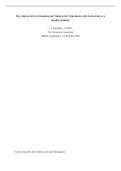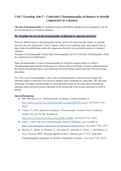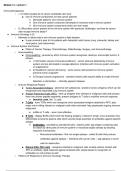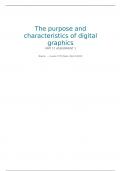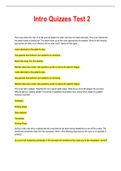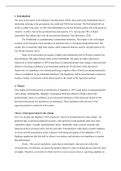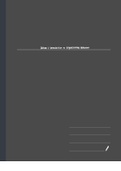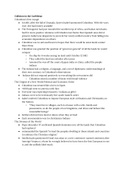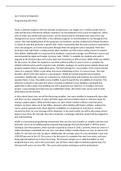The relation between Education and Voting in the Netherlands, with Social status as a
possible mediator
L.J. Hemelrijk - 2739099
Vrij Universiteit Amsterdam
Datalab Assignment 2 - 16 December 2022
Course: Inequality and Conflict in Societal Participation
, 1. Introduction
The most recent report of Centraal Bureau voor de Statistiek (CBS) in the Netherlands showed that
neighborhoods with relatively many low-educated people have a much lower voting turnout for both
municipal and parliamentary elections (CBS, 2022). This unequal turnout is a relevant issue; if lower
educated people disproportionately fail to vote, governments and legislators have fewer incentives to
consider their points of view in policy making (Gallego, 2009). While concerning, the unequal voting
turnout in the Netherlands is not surprising. Numerous studies of political participation in Western
democracies have shown that individuals with higher education participate in political activities to a
larger extent (Persson, 2015). The latest report of Sociaal en Cultureel Planbureau (SCP) shows that
the Dutch are increasingly highly educated (Maslowski, 2020). As the level of education in the
Netherlands is rising, one might expect political participation to rise as well. Nonetheless, political
participation in the Netherlands has stayed rather stable (den Ridder, 2020). Therefore, a number of
recent studies have started to question the well established assumption that education has a direct
effect on political participation (Persson, 2015).
This paper examines the relationship between education and voting in the Netherlands, and
considers social status as a possible mediator in this relationship. On the basis of a theoretical
framework, two hypotheses were formed and thereafter tested through a regression analysis. Finally,
based on the results of the regression analysis a conclusion is drawn.
Theoretical framework
This chapter discusses two theoretical models regarding the relationship between education and
political participation. Based on these theoretical models two hypotheses are formulated, which form
the basis of the regression analysis carried out in this report.
The Absolute Education Model
According to the absolute education model, education has a direct causal effect on political
participation (Persson, 2015). A great number of studies on political participation in Western
democracies have verified this view. The absolute education model assumes that education effects are
a process on the individual level and do not depend on the level of education in the environment. The
more education an individual has, the more likely he or she is to participate in political activities
(Persson, 2015) Education is assumed to generate more civic skills and political knowledge, which
trigger participation (Verba, Schlozman & Brady, 1995; Persson, 2015). In addition, Lewis-Beck et al.
(2008) propose that more formal education leads to a stronger interest in politics, growing concern
with elections, greater confidence in playing one’s role as a citizen, and a deeper commitment to
being a good citizen. Converse (1972) went even further, stating that education is the ‘universal
possible mediator
L.J. Hemelrijk - 2739099
Vrij Universiteit Amsterdam
Datalab Assignment 2 - 16 December 2022
Course: Inequality and Conflict in Societal Participation
, 1. Introduction
The most recent report of Centraal Bureau voor de Statistiek (CBS) in the Netherlands showed that
neighborhoods with relatively many low-educated people have a much lower voting turnout for both
municipal and parliamentary elections (CBS, 2022). This unequal turnout is a relevant issue; if lower
educated people disproportionately fail to vote, governments and legislators have fewer incentives to
consider their points of view in policy making (Gallego, 2009). While concerning, the unequal voting
turnout in the Netherlands is not surprising. Numerous studies of political participation in Western
democracies have shown that individuals with higher education participate in political activities to a
larger extent (Persson, 2015). The latest report of Sociaal en Cultureel Planbureau (SCP) shows that
the Dutch are increasingly highly educated (Maslowski, 2020). As the level of education in the
Netherlands is rising, one might expect political participation to rise as well. Nonetheless, political
participation in the Netherlands has stayed rather stable (den Ridder, 2020). Therefore, a number of
recent studies have started to question the well established assumption that education has a direct
effect on political participation (Persson, 2015).
This paper examines the relationship between education and voting in the Netherlands, and
considers social status as a possible mediator in this relationship. On the basis of a theoretical
framework, two hypotheses were formed and thereafter tested through a regression analysis. Finally,
based on the results of the regression analysis a conclusion is drawn.
Theoretical framework
This chapter discusses two theoretical models regarding the relationship between education and
political participation. Based on these theoretical models two hypotheses are formulated, which form
the basis of the regression analysis carried out in this report.
The Absolute Education Model
According to the absolute education model, education has a direct causal effect on political
participation (Persson, 2015). A great number of studies on political participation in Western
democracies have verified this view. The absolute education model assumes that education effects are
a process on the individual level and do not depend on the level of education in the environment. The
more education an individual has, the more likely he or she is to participate in political activities
(Persson, 2015) Education is assumed to generate more civic skills and political knowledge, which
trigger participation (Verba, Schlozman & Brady, 1995; Persson, 2015). In addition, Lewis-Beck et al.
(2008) propose that more formal education leads to a stronger interest in politics, growing concern
with elections, greater confidence in playing one’s role as a citizen, and a deeper commitment to
being a good citizen. Converse (1972) went even further, stating that education is the ‘universal

